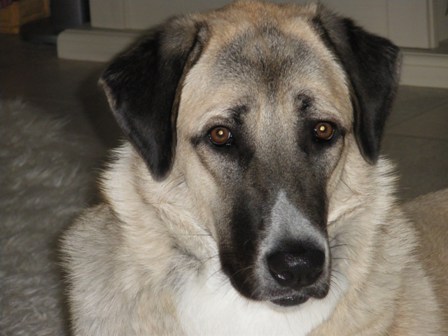 Available Dogs | VOLUNTEER/ Donate | Adopt | FOSTER |
About Anatolian ShepherdsThe Anatolian Shepherd Dog is a large and powerful dog, and is not suited for everyone. They were bred for hundreds, if not thousands, of years in their native Turkey as Livestock Guardians for the flocks of semi-nomadic shepherds. Their natural foes included wolves, bears, and wild boar. Anatolian Shepherds have only been in the U.S. since the 1970's and still retain their primitive instincts. They are quite different than most breeds of dogs that one would have as a pet as they have not been domesticated as most breeds. Anatolians are hard wired to be independent thinkers, territorial, wary of strangers and often unfriendly to other dogs. What does all of this mean? What can you expect from an Anatolian? Hard wired to be independent means this dog may not listen to you and may be slow to respond to commands. If you want a dog that comes right away when you call it, this is not the dog for you. Being an independent thinker means the dog likes to make it's own decisions and may not care whether you like it or not. This is not a dog that can be taken on off leash hikes or walks. They will hear you calling but will not come to you unless they feel like it.
What does it mean to be territorial? Wary of strangers? The Anatolian is naturally territorial and will always defend its home and family without any training. It is their natural instinct to defend against who or what they feel are intruders. The Anatolian may have a different view than you do of who are intruders and who are not. Even though you feel Aunt Sue is a welcome visitor, your Anatolian may not see it the same way and may greet Aunt Sue with barking, raised hackles, possibly even growling. You may need to make changes in the way you allow your dog to greet visitors if you have an Anatolian. What about other dogs? Will they get along with my neighbor's dogs? Maybe, maybe not. Don't expect an Anatolian to be a social butterfly. Some dogs are more easy going than others but many do not care for dogs of the same gender and dogs they do not know. Dog parks are not always an option and doggy day care might be out of the question as well. So you think you want a dog that will bark to alert you if something is amiss? That's great, we all want the peace of mind in knowing that we have a protective dog on duty. Just remember that the Anatolian is going to have a different set of ideas when it comes to deciding whether or not to bark. You may see it written on a website that they know the difference between what is a "real" threat and what is not and will only bark when necessary. That's probably true, however, the Anatolian will have a different definition than you do of what is a "real threat." Be prepared for barking. If you live in town, you will not be able to leave your Anatolian outside overnight. They do most of their barking after the sun goes down and the predators come out. Many people think Anatolians are a better choice over a dog like a Great Pyrenees because they don't have the long coat. That is true, the ASD coat does not need as much grooming as a Pyrenees coat and won't mat as easily, however, they "do" shed and they shed "a lot." A lot. Lots of hair. If you live in a mild climate, they will shed all year long. Anatolians blow their undercoat twice a year, as well. Anatolians have been bred to be livestock guardian dogs, however, not every dog is well suited to that job. In rescue, more than half of our dogs are given up because they did not work out as a working dog. For this reason, most of our dogs are looking for companion homes. Anatolian Shepherds can be wonderful companions but you will need to be aware of their special personality and be willing and able to make changes in the way you do things. Don't get an Anatolian and expect it to act like a Golden Retriever. These are Old World dogs that were bred to live in the pasture with little human direction. They still retain these Old World traits even if they are living in suburbia. It takes dedication and commitment to work with this independent breed. Feel free to contact us for more information.
Please be sure to read all about ASDs before considering adopting one!
|



